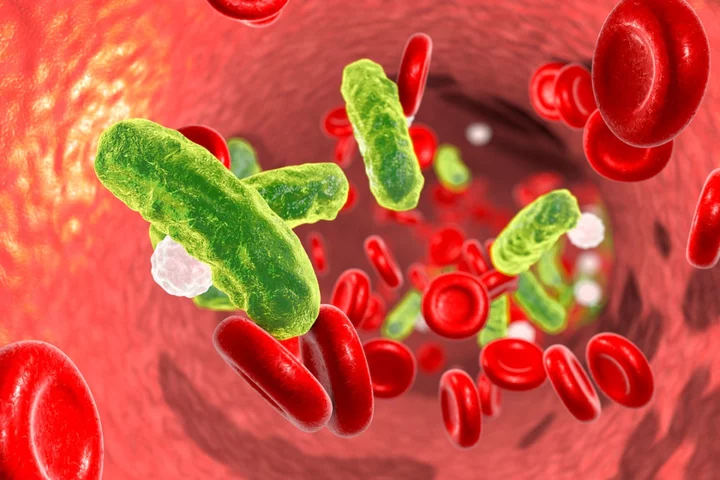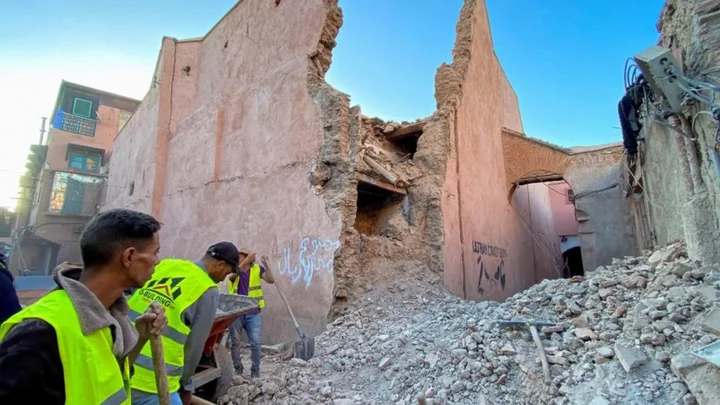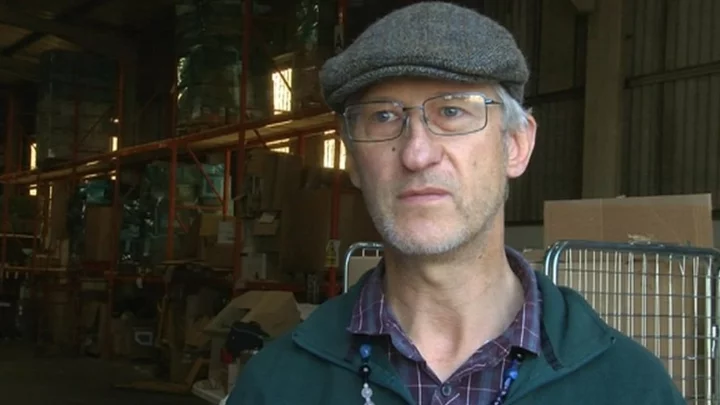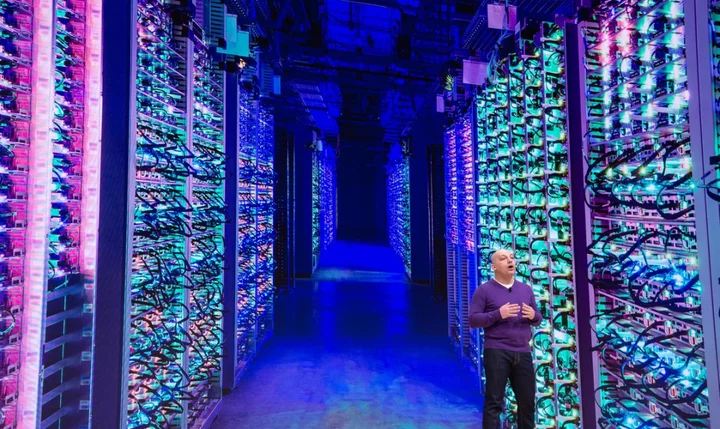
New invention could herald ‘battery revolution’, scientists say
Researchers have invented a new battery that they claim could have profound implications for the future of energy storage and renewable technologies. The lithium-based redox-flow battery, developed by a team at the University of Cincinnati, could prove crucial for wind and solar operations, where large-scale batteries are needed to store energy during times of overproduction and release it when production drops off. “Energy generation and energy consumption is always mismatched,” said Jimmy Jiang, who led the research at the University of Cincinnati. “That’s why it’s important to have a device that can store that energy temporarily and release it when it’s needed.” The novel design removes the membrane that separates the positive and negative sides of the battery, which is one of the most expensive parts of this type of battery and has previously hindered development. The membrane-free battery exhibited high voltage and energy density that could potentially meet the demands of large-scale green energy operations at an economically viable cost for the first time. “This design significantly decreases material costs,” said Soumalya Sinha, a visiting professor at the University of Cincinnati who was involved in the research. “We’re trying to achieve the same performance at a cheaper cost.” The team has submitted patent applications for the design, which Dr Jiang said will herald a “battery revolution” within the next 20 years. “I am confident about that,” he said. “There is a lot of intense research going into pushing the boundaries of battery performance.” The research was detailed in a paper, titled ‘Development of high-voltage and high-energy membrane-free nonaqueous lithium-based organic redox flow batteries’, published in the journal Nature Communications. Read More Volcano discovery could power electric cars for decades, scientists say
2023-09-12 03:57

Ukraine claims to retake Black Sea drilling rigs from Russian control
The four strategically important oil and gas platforms were seized by Russia in 2015.
2023-09-12 03:53

World Sepsis Day: What is the condition and its symptoms?
Sepsis is an illness that affects nearly 50 million people worldwide each year, with around 11 million deaths attributed to the condition. In the United States, at least 1.7 million adults in the US develop sepsis annually, and nearly 270,000 die as a result, the Centres for Disease Control and Prevention (CDC) says. It affects 245,000 people in the UK each year, with around 48,000 deaths, according to the UK Sepsis Trust. World Sepsis Day commemorated on 13th September every year, strives to raise global awareness of the life-threatening condition. The day is seen as “an opportunity for people worldwide to unite in the fight against sepsis,” the Global Sepsis Alliance says. Here is everything you need to know about sepsis: What is sepsis? Sepsis Research says when the condition strikes, the immune system “overreacts” and begins to attack the infection and everything else around it “including the body’s own tissues and organs.” “Any type of infection — bacterial, viral or fungal — can lead to sepsis,” it adds. When sepsis occurs, it can cause inflammation and cause blood clotting around the body, if it does not get treated, it can result in death, organ failure and tissue damage, CDC says. Sepsis cannot be caught from another person, the NHS explains. What are the symptoms? The World Health Organisation (WHO) explains that the condition is a “medical emergency,” so if you think a person is exhibiting signs of sepsis or if you are showing signs – make sure you call 999 or go to the emergency room immediately. According to WHO, common signs and symptoms include: • Fever or low temperature and shivering • Confusion • Difficulty breathing • Clammy or sweaty skin • Extreme body pain or discomfort • High heart rate, weak pulse or low blood pressure • Low urine output Symptoms in children include: • Fast breathing • Convulsions • Pale skin • Lethargy • Difficulty waking up • Feeling cold to touch What are the causes? The Mayo Clinic says any type of infection can lead to sepsis and those that more commonly cause the condition include infections of: • Lungs, such as pneumonia • Kidney, bladder and other parts of the urinary system • Digestive system • Bloodstream • Catheter sites • Wounds or burns “Sepsis often presents as the clinical deterioration of common and preventable infections such as those of the respiratory, gastrointestinal and urinary tract, or of wounds and skin. Sepsis is frequently under-diagnosed at an early stage - when it still is potentially reversible,” the Global Sepsis Alliance says. Who is most at risk? The people most at risk of the condition, according to Mayo Clinic, are: • People with lower immune response, such as those being treated for cancer • People with human immunodeficiency virus (HIV). • People with chronic diseases such as diabetes kidney disease or chronic obstructive pulmonary disease (COPD). • people who are in intensive care or longer hospital stays. • People over the age of 65 • Infants How many cases are there globally? The WHO says a scientific publication estimated that in 2017 there were 48.9 million cases and 11 million sepsis-related deaths worldwide, which accounted for almost 20 per cent of all global deaths. That same year, almost half of all global sepsis cases occurred among children with an estimated 20 million cases and 2.9 million global deaths in children under 5 years of age. How can it be prevented? The Global Sepsis Alliance says the best to to avoid sepsis is by preventing infection. This can be done by undergoing vaccinations, ensuring that you only come into contact with clean water, washing your hands properly and if you are giving birth - making sure it is in a clean and sterilised environment. Can sepsis be treated? Sepsis can be treated with appropriate treatment such as antibiotics – this should be given as soon as possible. The CDC says sometimes “surgery is required to remove tissue damaged by the infection”. “Antibiotics are critical tools for treating life-threatening infections, like those that can lead to sepsis,” the CDC adds. Read More 5 things everyone needs to know about eczema 13 potential cancer symptoms you should get checked out How can I improve my teenager’s low mood? Duran Duran’s Andy Taylor says he’s ‘asymptomatic’ after end-of-life diagnosis Nine hours of parallel surgery: how Britain’s first womb transplant was carried out Bursts of activity that make you huff and puff ‘linked to reduced cancer risk’
2023-09-12 03:20

Canada Truck attack: Trial begins for man accused of killing Muslim family
It is the first trial in Canada to weigh whether alleged white nationalism can count as terrorism.
2023-09-12 03:18

Morocco earthquake: Trowbridge community 'overwhelmed' by support
The Moroccan community appeals for aid to send to families impacted by the disaster.
2023-09-12 02:55

Dollymania: When Dolly the Sheep Created a ’90s Media Sensation
Dolly the sheep was the first animal cloned from a single adult cell—and raised a lot of questions about the future of human cloning.
2023-09-12 02:22

US expects Blinken will host China's top diplomat Wang Yi before year-end
WASHINGTON Washington expects U.S. Secretary of State Antony Blinken will host China's Foreign Minister Wang Yi in the
2023-09-12 02:20

Ein el-Hilweh: Deadly clashes resume in Palestinian camp in Lebanon
At least 10 people have reportedly killed in intense fighting between rival groups at Ein el-Hilweh.
2023-09-12 01:49

Morocco earthquake: Villagers' hopes waning in search for survivors
Rescuers have been using their bare hands to dig for survivors as the death toll climbs.
2023-09-12 01:30

Britain may designate genomics sector as critical infrastructure
By Alistair Smout LONDON Britain is exploring designating its genomics sector as critical national infrastructure, Deputy Prime Minister
2023-09-12 01:25

Morocco earthquake: 'Everything shook like you can't describe' says expat
Steve Sleight, a mountain guide living in Morocco, is helping those caught up in the disaster.
2023-09-12 01:16

AI is using vast amounts of water
Artificial intelligence is using gallons upon gallons of water. Microsoft alone used more than 2,500 Olympic-sized swimming pools of water in its data centres last year. The latest numbers are leading to yet more questions about the sustainability and environmental dangers of the growth of artificial intelligence and related technology. Artificial intelligence requires vast computing resources, undertaking deeply complex calculations on behalf of people around the world. AI systems tend to be run in the cloud rather than on individual people’s computers, meaning that companies running them must operate vast server farms to deal with the queries of their users. Those server farms in turn need to pump in water to cool themselves down, because of the heat generated by those computers. That has long been a concern for environmentalists, but the sharp growth in artificial intelligence has led to even more use. Microsoft’s water consumption rose 34 per cent between 2021 and 2022, according to its latest environmental report, highlighted by the Associated Press. It was up to almost 1.7 billion gallons. Not all of that is from artificial intelligence. But Shaolei Ren, a researcher at the University of California, Riverside working to better understand the environmental impact of AI told the AP that the “majority of the growth” is because of the technology. Google also said that its water use had increased by 20 per cent over the same period. That varied across its different data centres, which are based in different parts of the US. For each 5 to 50 prompts, or questions, put to ChatGPT, it uses 500 millilitres of water, according to a paper that will be published by Professor Ren and his team later this year. Many technology companies have expressed concerns about their own water use, and how to minimise any negative effects of their data centres. The environmental concerns can be especially pressing because the use of water can be focused in particular areas around a data centre, meaning that the damage may not be spread. Google said last year for instance that “Wherever we use water, we are committed to doing so responsibly”. That includes analysing where water is being used and how much stress it might put on the surrounding area, for instance. Read More AI can help generate synthetic viruses and spark pandemics, warns ex-Google executive China’s ‘government-approved’ AI chatbot says Taiwan invasion likely Google launches AI to go to meetings for you
2023-09-12 00:55
